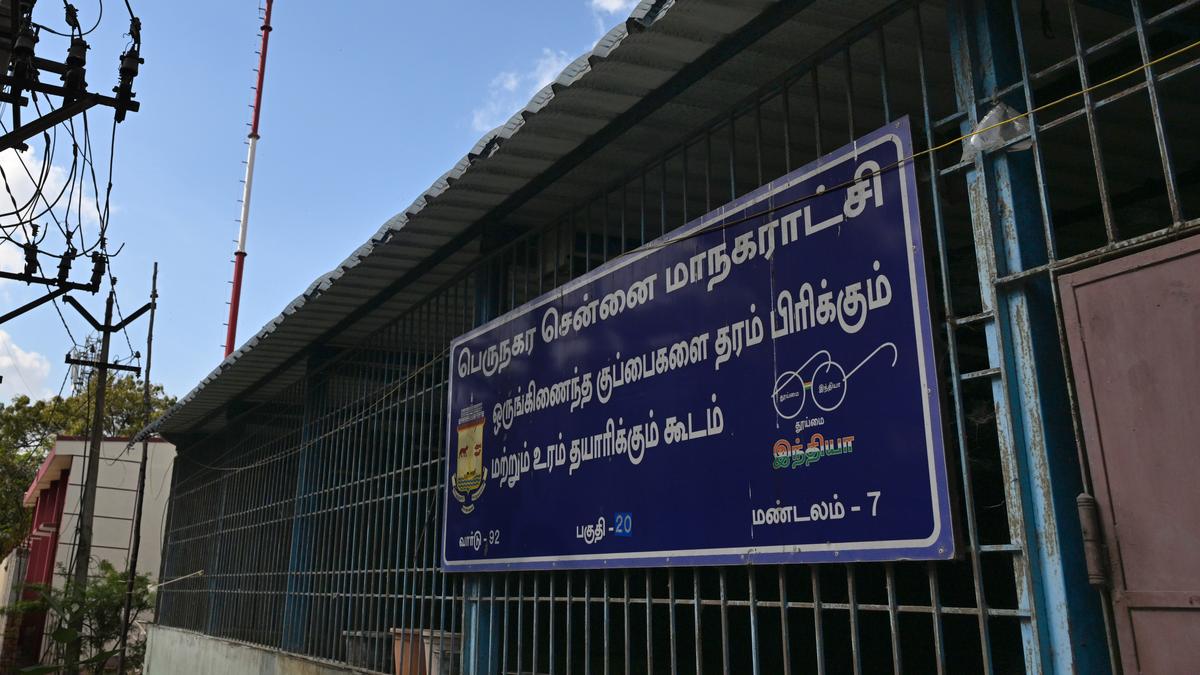The waste- processing facility on Mogappair Road has been identified for demolition. The land will be used for modernisation of the crematorium.
| Photo Credit: M. Vedhan
:
As the Greater Chennai Corporation has started closing micro-composting centres and material and resource recovery centres, which were constructed for decentralised waste-processing in the city, residents have demanded better infrastructure and improved waste management to prevent pollution in the residential areas. The Corporation has announced that 168 of the 190 micro-composting centres and 88 of the 137 material and resource recovery centres will be closed in the 15 zones. However, the Corporation Council has not announced alternatives to these facilities. Residents have demanded that the Corporation launch projects that do not pollute the residential areas.
Campaign stepped up
They have also demanded that the civic body close the remaining waste management projects to prevent pollution in the residential areas, pointing to public health issues. After the Corporation Council made the announcement, residents in the polluted areas such as Perungudi and Kodungaiyur have stepped up their campaign to close the waste-processing plants in the residential areas.
A. Francis, president, Federation of Thoraipakkam Residents’ Welfare Associations, says the Corporation Council’s decision to close micro-composting centres has increased the chances of better civic projects to mitigate the pollution in the residential areas. “Decentralised waste-processing near the residential areas is bad for public health. The large waste-processing facilities proposed at Perungudi are expected to increase public health risk. Residents have opposed the projects. The government should come up with an alternative plan to process waste in areas far away from the congested residential neighbourhoods. Perungudi has many residential areas and information technology companies. So, the civic body should not operate waste-processing facilities at Perungudi,” he says.
MDMK councillor S. Jeevan says waste-processing in the residential areas is leading to public health issues. “In addition to small micro-composting centres in our ward, residents have been subjected to a higher risk from large waste-processing facilities in the Kodungaiyur dump. We need better solutions that would help to prevent pollution and improve public health. Skin diseases are rising. Cases of lung diseases are also high near the Kodungaiyur dump. Will the government try to find an alternative to the waste-processing at Kodungaiyur,” he asks.
Former Congress councillor P.V. Tamil Selvan says the residents of Mogappair have protested against pollution caused by waste-processing in the congested residential areas. “The waste-processing facility on Mogappair Road has been identified for demolition. The land will be utilised for modernisation of the crematorium,” he says.
Stench in parks
AIADMK councillor J. John says the waste-processing facilities near the residential areas have been causing public health issues during the northeast monsoon. “Residents complained about stench in parks that were used to compost biodegradable waste.” Velachery resident S. Kumararaja says the crematoria are still being used for waste management, which is not acceptable to most residents. “Residents want the Corporation to shift all the waste management facilities from the crematoria. We want the Corporation to give all the crematoria a makeover. Waste management vehicles of Urbaser and other private agencies have been parked at the crematoria. When residents visit the crematoria, the stench is unbearable,” he says.
Former Chennai Corporation engineer and disaster management expert N. Mathavan says waste-processing should be carried out without polluting the residential areas. “A few months ago, our colleague’s father passed away. All engineers of the Chennai Corporation experienced the difficulty of visiting the crematorium that had been polluted. We have discussed the importance of keeping the crematoria clean and preventing waste accumulation therein,” he says.
The Chennai Corporation has also advised plot-owners to prevent accumulation of municipal solid waste on vacant land to reduce public health risk. “We have penalised residents whose land has accumulated waste,” says an official.
A few councillors have also advised the Corporation to initiate measures to cancel allotment made by the Tamil Nadu Housing Board and Tamil Nadu Urban Habitat Development Board if such land has waste accumulation because of poor maintenance and delay in construction. “Once a dump was identified and the Corporation erected a board advising that the polluted land belonged to the civic body. The owners came rushing to the Corporation. After verifying the ownership, they were asked to clear the waste. They were also fined,” says a councillor.
Residents have also planned to launch a campaign to stop waste-processing in all the 15 zones. Political parties like the PMK have supported the public protest against waste incineration at Perungudi and Kodungaiyur. Residents have been planning to get the support of more political parties.
Plan shelved
When the AIADMK was in power, the government identified land at Kuthambakkam and Minjur as an alternative to Perungudi and Kodungaiyur. But the plan was shelved owing to opposition from local residents. Pointing to the shelved proposal made by the AIADMK government to close the Perungudi and Kodungaiyur dumps, residents have demanded that the government identify new land parcels on the city outskirts for waste-processing.
Published – March 09, 2025 10:44 pm IST
